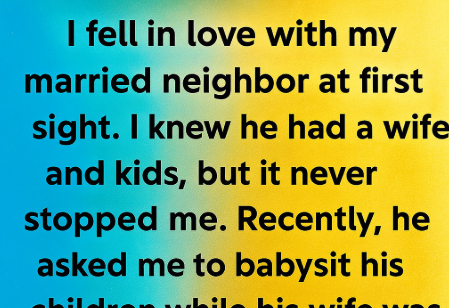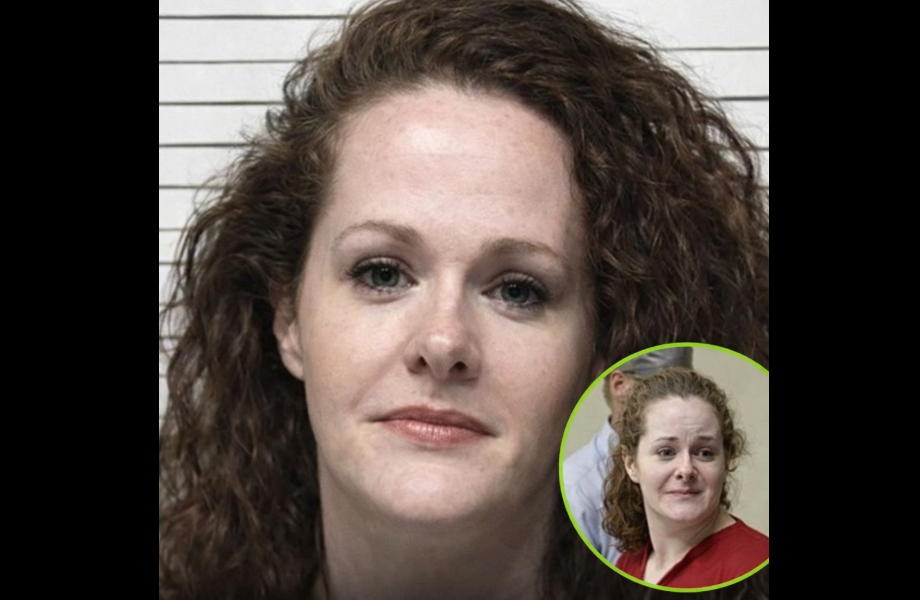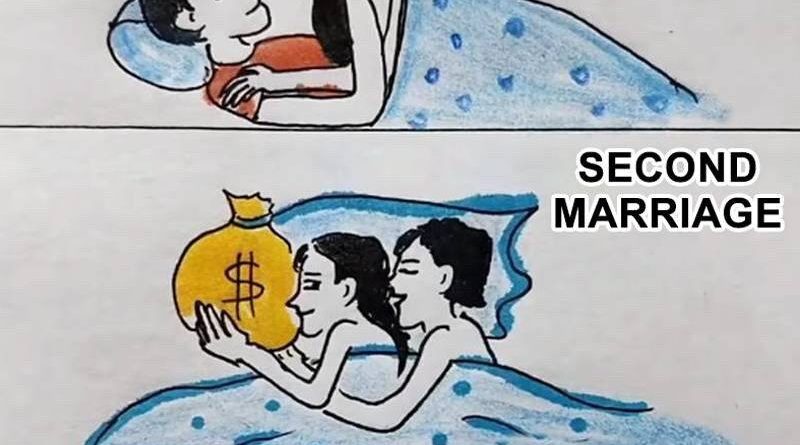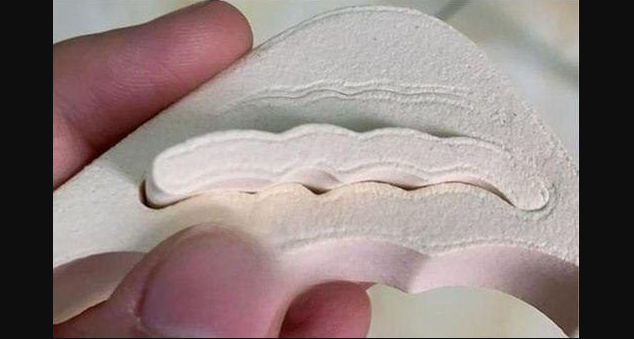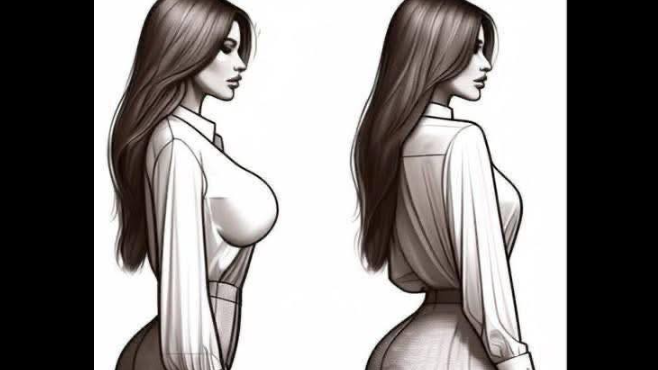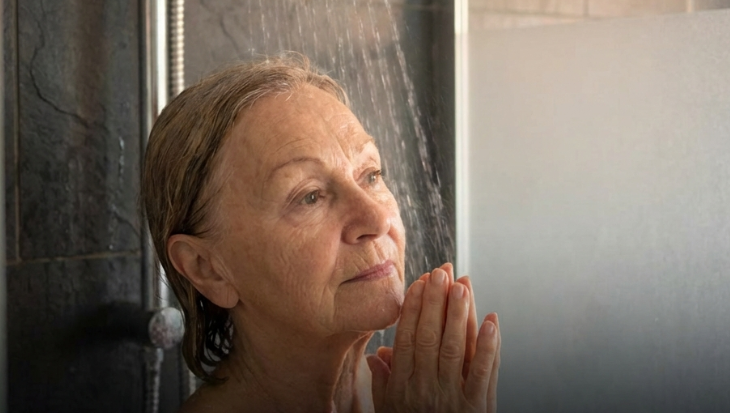I fell in love with my married neighbor the moment our eyes met. I was aware he had a wife and children, yet my heart refused to turn away. Not long ago, he asked me to care for his kids while his wife was recovering in the hospital. I said yes without hesitation. When I met his children, I was stunned—they bore an uncanny resemblance to me.
It wasn’t a fleeting, generic similarity. Their eyes mirrored mine, their noses carried the same curve, and the dimple on their left cheeks appeared when they smiled, just like mine. My breath caught when the eldest, a boy around eight, tilted his head in confusion—a gesture I recognized from my own childhood.
My thoughts spiraled. Could it be? No, it seemed impossible. I had never been intimate with him—not in a physical sense. My feelings existed in daydreams, in stolen glances as he tended his garden or greeted the delivery driver. That was the extent of it.
I tried to dismiss the similarities as coincidence. But as I spent more time with the children—three bright souls—the connections grew undeniable. Their kindness, their sharp wit, their humor felt like echoes of my own. It was as though fragments of me were living in their world.
When he returned that evening, I ventured lightly, “Your kids are wonderful. They remind me so much of someone I know.”
He grinned, shrugging off his jacket. “Really? Most people say they take after their mom.”
I smiled faintly and left, but the thought lingered, tugging at me.
The next day, I revisited a chapter of my life I’d long buried. A decade ago, desperate and low on funds, I had donated my eggs. I was twenty, naive, and told the process was anonymous. I’d never meet the children, and they’d never know me. I thought I was simply offering a family a chance to grow.
But what if those eggs…?
Sleep evaded me that night. I lay awake, staring at the ceiling, wondering if fate had woven an intricate tapestry I hadn’t seen coming. The man I’d quietly admired, perhaps even built a future with in my mind, might be raising children born from my donation.
I gathered my courage the next time I watched the kids. In a quiet moment, I asked, “Can I ask something personal?”
He looked up, surprised but kind. “Of course.”
“How did you and your wife have your children? I hope this isn’t out of line, but… they look so much like me.”
He froze, then exhaled, rubbing his neck. “We struggled to conceive. We used an egg donor. The clinic described her as… intelligent, creative, tall, with green eyes.”
“That’s me,” I whispered, my voice barely audible.
His eyes widened. “You’re serious?”
“I donated ten years ago. I never knew who received them.”
The room grew quiet, the hum of the refrigerator filling the space. He sank into a chair, staring at me as if seeing me for the first time. “You’re not kidding?”
I nodded. “I didn’t know until I met them. It’s like seeing parts of myself in your home.”
He looked shaken but not upset. Just… overwhelmed. “My wife doesn’t know the donor’s identity. It was anonymous. This is… a lot to process.”
We sat in silence, words unnecessary for the moment.
In the days that followed, the air shifted. I continued caring for the kids, but a new weight hung between us—not hostile, but heavy with unspoken questions. The world felt rearranged, and I was still finding my footing.
Then his wife returned, glowing despite her recent surgery. She embraced her children with a warmth that made my chest ache and thanked me with genuine kindness.
Guilt washed over me. My feelings for her husband, though unacted upon, were real. And now, knowing her children carried my biology in some distant way, I felt like an intruder in their home.
She invited me for tea one afternoon, just the two of us.
I hesitated but went.
We sat on her porch, the kids’ laughter drifting from the yard. She looked at me directly and said, “I sense something between you and my husband.”
My stomach dropped. “I promise, nothing has ever happened. I just—”
“I’m not naive,” she said gently. “I’ve seen how he looks at you. And how you look at the kids. I know you’re their donor.”
I felt as if the ground had vanished. “How did you—?”
“I saw a photo at the clinic years ago. A blurry one. But your eyes… they stayed with me.”
I couldn’t speak.
She sipped her tea calmly. “I was angry at first. Then I realized… maybe this is how it’s meant to be.”
“What do you mean?” I asked.
She smiled softly, though it carried a hint of sadness. “You gave us a miracle we couldn’t have had otherwise. You gave me my children. And now you’re here, as if the universe guided you to us. Not to disrupt, but maybe to complete something.”
Tears welled in my eyes. “I never meant to overstep.”
“I know,” she said warmly. “But I need to ask something of you.”
I braced myself.
“Please step back.”
Her words hit like a wave.
“I don’t resent you,” she added quickly. “But my kids don’t know the truth, and they don’t need to. I need to protect our family. Please… give us space to be whole.”
I nodded, unable to find words.
I stopped watching the kids after that. I avoided their street, though the pain of it cut deeply. Letting go of a dream I’d never fully held—of the children I’d only briefly known, of the man I’d quietly loved—was harder than I’d imagined.
Months passed. I poured myself into work, hobbies, and rebuilding my life. The ache softened, though it never fully faded.
Then, one Sunday, a handwritten letter arrived from her.
It read:
“I want you to know we’re doing well. The kids are flourishing. I told them about a kind woman who helped us when I was unwell. They remember you fondly and asked about you. I said you’re off on your own journey now, and I meant it.
You’re woven into our story, whether we meet again or not. Your gift—your eggs, your time, your care—meant everything. I hope you find someone who sees you for the incredible person you are. And I hope you find the joy and chaos you helped bring to us.
With gratitude, Mira.”
Tears fell as I read it, but they carried release—easing the weight of guilt, loss, and unanswered questions.
A year later, I moved to a new city with a new job. I began volunteering at a children’s center, tutoring kids who needed extra support. It felt like the right place to channel the lingering maternal pull in my heart.
Then I met someone. Not a neighbor or a fantasy, but a real, grounded person. He worked at the center too. Our friendship grew over shared coffees, stories of scraped knuckles, and dreams born from humble beginnings.
When I shared my donor past, he didn’t hesitate. “You helped create a miracle,” he said. “That’s something to carry with pride.”
In that moment, I knew I’d found my way back to myself.
Not because I won the love I once imagined, but because I rediscovered my own worth. Along the way, I found someone who loved me not for what I’d given to others, but for who I’d become through it all.
Love doesn’t always arrive as we expect. Sometimes it’s in quiet letters, in new beginnings, in the courage to let go of what we thought we needed.
Sometimes the greatest endings are those where we release our old desires to embrace something even more beautiful.
Life has a way of guiding us toward what we truly need. What feels like loss can become the path to the life we were meant to live.
If this story resonated with you, share it with someone who might find meaning in it. And don’t forget to like—it might reach someone standing at the start of their own transformative journey.
